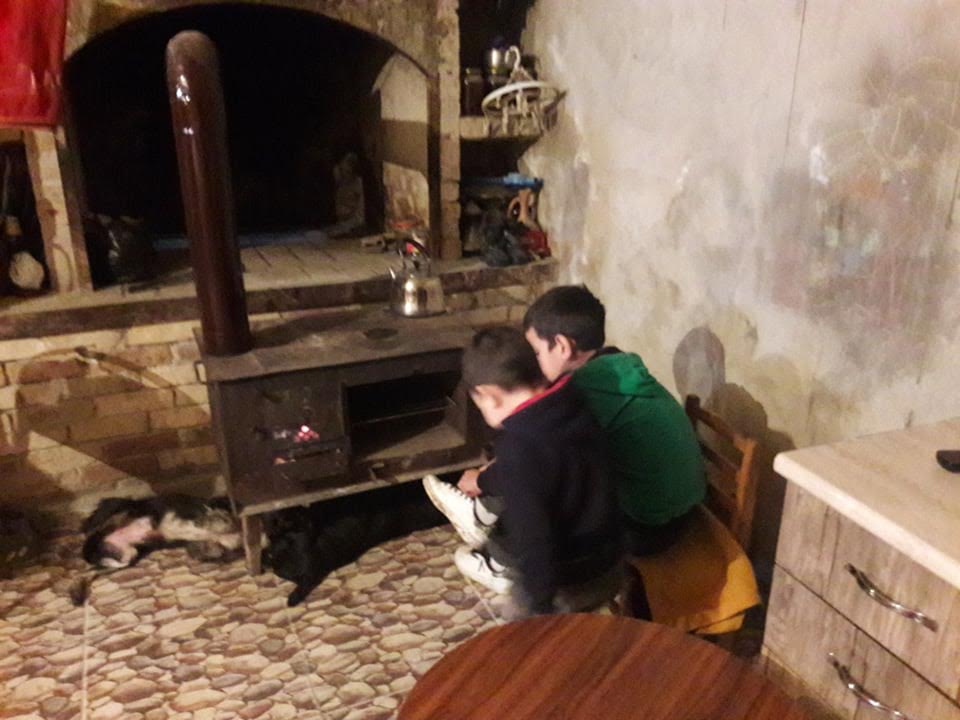Manana Vardiashvili
Khatuna Ch. applied to Human Rights Center (HRC) for legal aid. She lives in Kharagauli with her husband and 4 minor children. Three out of the four children go to school. Because Ch.’s family does not have Internet and computer, children cannot attend online classes. The family has already received a warning from the school as due to many absences, the current education year may be considered as an academic for the children.
Khatuna Ch.'s family is registered in the database for socially vulnerable households and receives social allowance payments. The parents live in one room of a two storied private house with 4 minor children. The house that was already a crumbling building, was left without a roof following heavy rains in June 2019 and the particularly needy family managed to arrange only one room in the house.
"As the victims of the disaster, the Mayor's Office provided us with an allowance and now we are building the roof. We are six (6) individuals living in one room which we are not able to heat normally. I am more concerned now with the education of the children than with the living conditions. One child is in the 5th grade, the second in the 4th grade and the third in the first. We do not have Internet. We have neither a computer nor a phone in which we would activate Microsoft Teams program and children would be able to attend online lessons. We need at least GEL 300 to buy such a phone or a computer. Our only income is social allowance amounting to GEL 560.
The problem also is that both elder children have online lessons at the same time. It turns out that we need 2 computers or 2 phones. We learn from the classmates what assignments the teacher gives them and I try to help the children to do the homework, however I see that it is very difficult for them to master the curriculum without the teacher explaining it. I was told at school that children could be left out of class because of missing many classes. I do not know what to do. "We really can't effort to buy a computer and a phone now," says Khatuna Ch.
The socially vulnerable family also found it difficult to provide nutrition for their children after the pandemic caused by the coronavirus: many food products, including oil, meat and cereals, became very expensive due to the depreciation of lari. Khatuna brings food for her husband and children from a soup kitchen where she is allowed to take food for three people.
"This is 3 loaves of bread a day and the following meal in two 850 gr. jars: borsch, chicken soup or buckwheat whatever is on the menu that day. I receive food for 3 people for a family of 6. "When I applied to the soup kitchen management asking for food for all four children, they told me that they now have many beneficiaries, including families with children, and they could not give more," Khatuna says.
Khatuna is 33 years old. She is unemployed. Her husband is also unemployed. Khatuna applied to the Mayor’s Office of Kharagauli for help. She asks for a job but in vain.
"We found a very difficult situation in this family. “The room where 4 minor children live with their parents is cold," says Ana Chapidze, a lawyer within HRC. "The children are not being fed properly.” They do not have Internet and computer and their constitutional right to be educated is being violated because they do not have the opportunity to study remotely."
Ana Chapidze, a lawyer within HRC has already addressed the Ministry of Education and the Head of the Social Affairs Office which is the primary structural unit within the Mayor’s Office at Kharagauli Municipality. HRC demands that the State assess the individual needs of Khatuna Ch.'s family. To provide appropriate assistance to the family and create the necessary conditions for the children to receive an education.
Human Rights Center is implementing the project "Free Legal Advocacy and Human Rights Monitoring after the Coronavirus Pandemic" with the assistance of the Embassy of the Netherlands in Georgia. The aim of the project is to identify the possible violations of human rights during and after the state of emergency announced for the prevention of the spread of the coronavirus, and to raise awareness about the possible violations in Tbilisi and five regions of Georgia: Shida Kartli, Kakheti, Kvemo Kartli, Imereti and in Samegrelo.
News
December 13, 2023
Ethnic minorities outside the peace dialogue
November 6, 2023
‘Peace’ agenda of political parties
Popular
Articles
February 13, 2024




